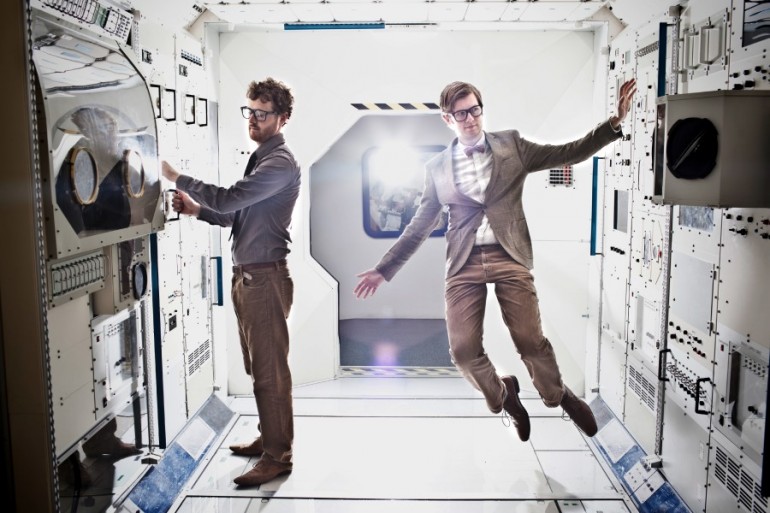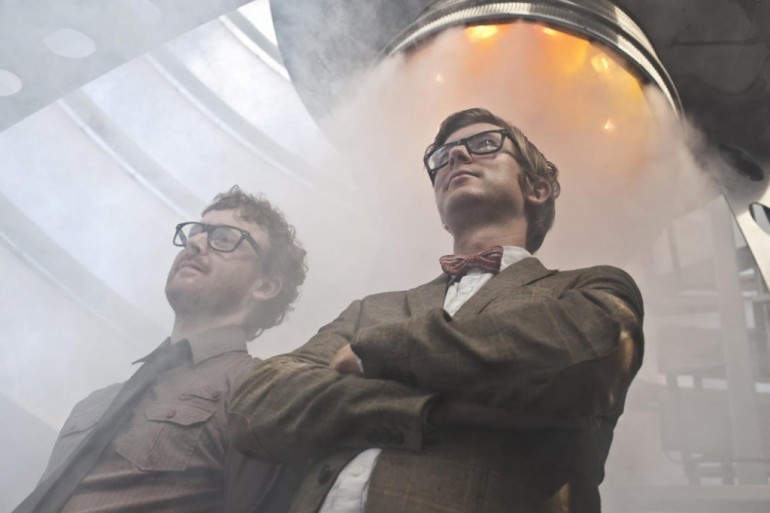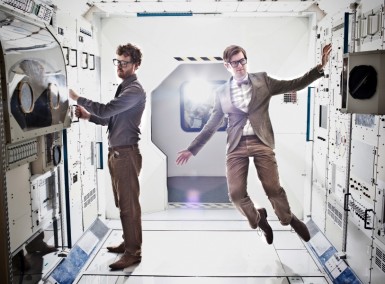
Space. The final frontier. These are the voyages of the starship PUBLIC SERVICE BROADCASTING. Its continuing mission? To explore strange new worlds of popular music, to seek out new possibilities of combining new media techniques and old rituals, to boldly go where no band has gone before. Yes, space is the limit and after everything the project of Mr. J. Willgoose, Esq achieved so far ever since it released its first EP back in 2010 we wouldn’t be surprised if this is just the start of something more.
PUBLIC SERVICE BROADCASTING is a special band. Willgoose and his partner Wrigglesworth are aiming for something that has become rare these days in the music industry: uniqueness. PUBLIC SERVICE BROADCASTING are special. We already sensed that on their stunning 2013 debut Inform – Educate – Entertain and we also had the pleasure of experiencing it live in form of the best performance at last year’s Reeperbahn Festival.
The look, the performance, the music – the concept behind the two British gentlemen is based on intelligent entertainment. They work with old public information films, sample archive footage and old documentaries, mix them with a broad range of music to create a sound somewhere between experimental pop and post-rock ambience. And their forthcoming sophomore album The Race For Space (out on February 23 via Test Card Recordings) goes even further, in terms of musical ambition and its content. Time to explore the mind of Mr. Willgoose, right?
Okay, let’s start with the obvious question. Why space? What fascinates you about the subject?
JW: I can’t really understand why anyone wouldn’t be interested in the subject. Our attempts to explore and understand our place in the universe, our first excursions from our own world, the incredibly brave people who undertook these missions, the incredibly clever people who provided the infrastructure for them to do so, the danger involved for all concerned, and the whole story played out to a fascinating geo-political background… I mean if you’re not interested in that then I’m not sure you’re trying hard enough as a human being.
In terms of the samples you use. Was the specification on a certain subject helpful for the production of the record?
JW: In some ways yes, in some ways no. It limited the scope of the research, which was great as obviously that cuts down a tremendous amount of work and helps to get things into focus quicker. At the same time once you’ve made that decision you are kind of stuck with it, and if you happen to think of something that doesn’t relate to the subject, or find something amazing you’d like to work with, you have to put it on the back-burner. Overall though I think it was very helpful in tying the album together.
How do you put the atmosphere and spirit of space into music? Did you had any special tricks and personal guidelines for the recording of the album?
JW: Not really – if anything I wanted to try and avoid too many tricks and tropes of science fiction soundtracks where everything is massive and epic and deafening. I wanted there to be more physical space in this record, more room between the instruments and between the notes, so there was a bit more time and room to think and let the album come to you.

Although old documentaries and propaganda films are the main inspiration for Willgoose and Wrigglesworth The Race For Space feels as if PUBLIC SERVICE BROADCASTING score their very own movie, an epic science-fiction blockbuster with a certain retro flavour. The band likes to close up in the style of the 50s and 60s and seem to prefer an analogue spirit over the benefits of the digital age. In combination with the old visuals you can’t deny the vintage flavour that surrounds the British duo. Still, Willgoose doesn’t live in the past as he explains to us: ‘This isn’t a history lesson. It’s a musical re-interpretation of certain historical events.’
The debut was already packed with plenty of it but the concept of album number two, which focusses entirely on the period when the USA and USSR fought to gain the upper hand in the space race, is even more ambitious and so is the sound of album itself. ‘It’s a much more musically and sonically complicated album than the first,’ tells us the band leader, ‘albeit in a relatively subtle way in some cases.’ From Kennedy’s first speech at the beginning of the 1960s to the moon landing: PUBLIC SERVICE BROADCASTING aren’t afraid to aim big this time.
‘It’s still growing and expanding’
‘The Race For Space’ sounds more mature than the debut. Was that the concept from early on?
JW: The idea was definitely to make it sound more ambitious and yes, possibly a bit more grown up. Because of the subject matter there’s a bit less license for frivolity, so it was always going to be a bit more serious, especially with certain topics like the Apollo 1 disaster. I’m happy with the way we’ve expanded the sound though – it’s a much more musically and sonically complicated album than the first, albeit in a relatively subtle way in some cases.
Do you feel that PSB have finally morphed into a full band after it started a bit as a solo project by you? Did your countless live shows influence the sound of the record?
JW: I think that happened after The War Room was recorded, to be honest. From that point on I was thinking about the live environment a great deal and making decisions during the recording process with that part of it very much in mind. We’ve recently added an extra touring musician too, JFAbraham, who’s on bass, percussion, trumpet and keys, so it’s still growing and expanding.
I like the way you guys combines a certain historic touch with a modern approach. Do you think we can learn something from the history?
JW: I think there’s a great deal that can be learned from the historical side of what we do, but I don’t like to be too preach-y, ironically, in trying to get across any one particular lesson or meaning from the things that we sample and re-work. I think it’s better to give people something that is open to interpretation and which they can use their imagination – or research, if they want to – to put their own meaning on. I don’t believe that the songwriter has ultimate control, or the final say, on the meaning of the works they produce. Once it’s out there, it’s almost like it doesn’t belong to you any more anyway, so it’s up to people to find their own meanings in it. The trick is to find interesting things to sample and to present them in a way that gives a new perspective or insight – and it’s not really for me to say if we’ve done that or not!
‘Without tea, we would be nowhere’
You think the human race should aim for space again or do we have to face enough problems down here?
JW: I know there are a lot of people who find it distasteful that we can find the money to send people into space when we don’t have the money to ensure there aren’t food banks in our country, or far worse inequalities and injustices abroad. I can see the logic in that but, equally, I can see the argument that if you waited for a perfect situation before trying to make technological breakthroughs, you would be waiting forever. I think technology is more likely to help achieve a fairer and more equal society, and the nature of the beast is that you never know where innovations are going to come from.
So, aiming for the universe would actually help the earth?
JW: Yes, a great deal of innovation has come from the various space programs that have been run over the years – and more fundamentally than that, I think the more we can do to understand the nature of the universe and our place in it, the better off we will be as a species. It might help us get a bit of perspective, understanding and stop us mis-using our time on Earth, and more importantly it might make us stop mis-using the Earth itself.
We’re all about hope and passion. What are the main elements that keep PUBLIC SERVICE BROADCASTING running?
JW: Hope and passion are two big ones, alongside a healthy dose of scepticism, a sense of humour and a large amount of hard work, but I’ll have to be honest and say that a good cup of tea is probably the primary ingredient. Without tea, we would be nowhere. No songs would get written, I’d be in a permanent bad mood and touring would be intolerable. So, tea it is.
—



